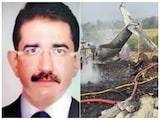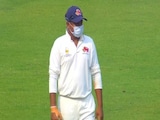The government on Tuesday said a sero survey has found that two-thirds of the population - aged above six years - has SARS-CoV-2 antibodies but stressed that around 40 crore people are still vulnerable to the infection and "there is no room for complacency". State heterogeneity "indicates the possibility of future waves of infection," the government warned, adding that people should travel only if fully vaccinated.
The overall seroprevalence was 67.6 per cent in the ICMR's 4th national COVID sero survey, held in June and July, that involved over 28,975 individuals (adults and children), apart from 7,252 healthcare workers, in 70 districts across 21 states where earlier three rounds were also conducted.
The sero prevalence in the age group of 6-9 years was 57.2 per cent, in age group of 10-17 years was 61.6 per cent, in 18-44 years was 66.7 per cent, in 45-60 years was 77.6 per cent and in over 60 years it was around 76.7 per cent, the government said and attributed the rise to the role of delta variant in spreading the second wave and to the vaccination cover.
In the third sero survey conducted in December-January, 2021, the sero-prevalence was 24.1 per cent. Besides, 85 per cent of the surveyed healthcare workers in the fourth round were found to have antibodies against SARS-CoV-2 and one-tenth were still unvaccinated.
Over 4.18 lakh people have died so far due to coronavirus, official data shows.
The government said the findings show there is a ray of hope, but "there is no room for complacency" and COVID-appropriate behaviour and community engagement have to be maintained.
Addressing a press conference, ICMR Director General Balram Bhargava said, "Two-thirds of the general population above the age of six, or 67.6 per cent were found to have SARS-CoV-2 antibodies in the latest national sero survey."
"A third of the population did not have SARS-CoV-2 antibodies, which means approximately 40 crore people are still vulnerable to COVID-19 infection,"
Those without antibodies run the risk of infection waves, Dr Bhargava said.
More than half of the children (6-17 years) were sero-positive and sero-prevalence was similar in rural and urban areas, he informed. Besides, 85 per cent of the surveyed healthcare workers had antibodies against SARS-CoV-2 and one-tenth were still unvaccinated.
The sero survey was conducted over 28,975 individuals (adults and children), apart from 7,252 healthcare workers in 70 districts across 21 where earlier three rounds were also conducted.
Dr Bhargava said that once India starts reopening schools, it will be wise to begin with the primary section as children have a lower number of ace receptors to which virus attaches, making them much better at handling viral infections than adults.
The government aims to vaccinate over 108 crore people by the end of this year.
The seroprevalence in rural areas was found to be 66.7 per cent and slightly higher in urban at 69.6 per cent.As per vaccination status, it was seen in 62.3 per cent among unvaccinated people, 81 per cent among those who took single dose of vaccine while it was 89.8 per cent in fully vaccinated people.
In the first sero survey done in May-June 2020, the seroprevalence was 0.7 per cent; in the second survey in August-September 2020, it was 7.1 per cent; in the third sero survey conducted in December-January, 2021 it was 24.1 per cent.
"Overall seroprevalence in healthcare workers was 85.2 per cent. We studied 7,252 healthcare workers and 10 per cent had not taken the vaccine while 13.4 per cent had taken one dose and 76.1 per cent had taken both doses of vaccine," he said.
An important point to remember here is that the national sero survey is not a substitute for local (state or district) level survey, Dr Bhargava said, adding it is just giving a bird's eye view or a panoramic picture of what is happening in the nation.
But there is heterogeneity which is occurring from state to state, district to district and we should be cognisant of that, he said and informed that stat- led sentinel sero-surveillance will inform further state-level action. "State heterogeneity indicates the possibility of future waves of infection. There might be some states where the population which is vulnerable is much higher there and so chances of future waves are higher in those states."
"Societal, public, religious and political congregations should be avoided. Non-essential travels should be discouraged and travel only if fully vaccinated," he said.
NITI Aayog Member (Health ) Dr V K Paul said 40 crore people have no antibodies and the pandemic is in no way over. The second wave is still persisting and the danger of new outbreaks is still very much there, he said.
"...that 40 crore people have no antibodies, we would like them to gain protection through vaccination and not the infection and that is the endeavour that this nation is mounting," he said.
Because such a large pool of vulnerable population is still amongst us - one out of three - therefore the pandemic is in no way over,.. . the overall vulnerability for the nation still remains and that is very evident," he said.
On the way forward, Dr Bhargava highlighted the need to ensure full vaccination of all healthcare workers as soon as possible, accelerating vaccination coverage in vulnerable population groups and ensuring adherence to non-pharmaceutical interventions.
He also stressed on continued tracking of Covid-infection in SARI cases in district hospitals.
"That is another very important tool that we use the SARI (Severe acute respiratory infection patients) and test them for COVID and rule out if there is any sudden spike of COVID-19 in SARI patients. We need to identify clusters and clinical severity and INSACOG is tracking variants of concern," he said.
Many states have done their own sero surveys and that will be very helpful in guiding the response to the pandemic.
Dr Paul said the third sero survey was in December-January, which may be taken as the seroprevalence post the end of the first wave and the rise in sero-positivity that can be seen has two factors to it.
"One is the second wave that is the suffering that the Delta variant inflicted on us but also part of sero-positivity is coming from vaccination coverage and the gradient between vaccinated and unvaccinated can be seen," he said.
On the situation in the country, Dr Paul said Kerala is still "static to slight rise" and Maharashtra is seeing some decline. Andhra Pradesh is still a cause of concern and 46 districts have more than 10 per cent positivity, he said.
He said some states have more than 10 per cent positivity. "It testifies to the fact that this level of seropositivity does not ensure that the pandemic is over and it is out there," he warned.
On the vaccine shortage in some states, Dr Paul said the states and UTS are informed two weeks in advance about the availability of the vaccines, so that they can plan accordingly.















